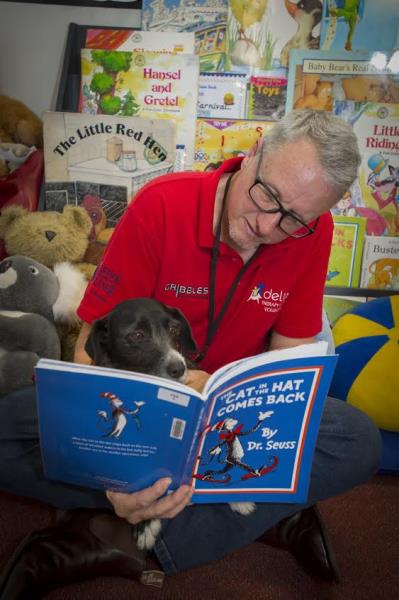
By NOEL MURPHY
IT SOUNDS odd but Tony Chalkley swears it works.
And so good is his idea of getting kids to read books to dogs that it’s moving into the classroom.
Heading the charge in this unusual reading therapy is Squirt, a black and white mutt that will participate in a 12-month study if Dr Chalkley can whip up enough money from an online fundraiser.
A Deakin University media lecturer and former primary school teacher, Dr Chalkley has spent long hours in the classroom with Squirt and seen some remarkable changes when kids read to the dog.
“It’s a little bit magical the way kids, who are normally reluctant readers, line up to read with Squirt the therapy dog,” he said.
“The simple act of patting and talking with Squirt triggers the desire to share stories from the children’s own pet history.
“Most kids seem to start by talking about the animals they’ve owned. Then they talk about life events that have happened with these pets and, finally, they share how they felt as a result.
“Something really fantastic happens when kids read to Squirt. Their confidence just soars – and I’d like to find out why.
“What is it about reading to a canine friend that motivates kids to learn to read?”
Dr Chalkley has embarked on a crowdfunding exercise to raise cash so he can get out to six schools in Geelong with Squirt. He expects the data he gathers will support existing pet and animal therapy programs, improve and expand the training of handlers and develop innovative ways to develop literacy skills in the classroom.
“Apart from literacy, dogs can help with things like easing the transition for prep students and providing a sense of connection for students from disadvantaged backgrounds,” he said.
“They’re also particularly loved by children with autism or dyslexia.”
“Reading to dogs provides a simple form of engagement. Dogs are non-judgemental and highly personable.
“They also provide a positive diversion for the child, so there’s less intense focus on their performance – and students feel like there is less pressure.”
Dr Chalkley’s fundraising site is pozible.com/project/195286.


![[READER COMPETITION] – Win a Viking european river voyage valued at $16,190](https://geelongindy.com.au/wp-content/uploads/2025/07/viking-competition-wesbite-image-3-324x235.png)



